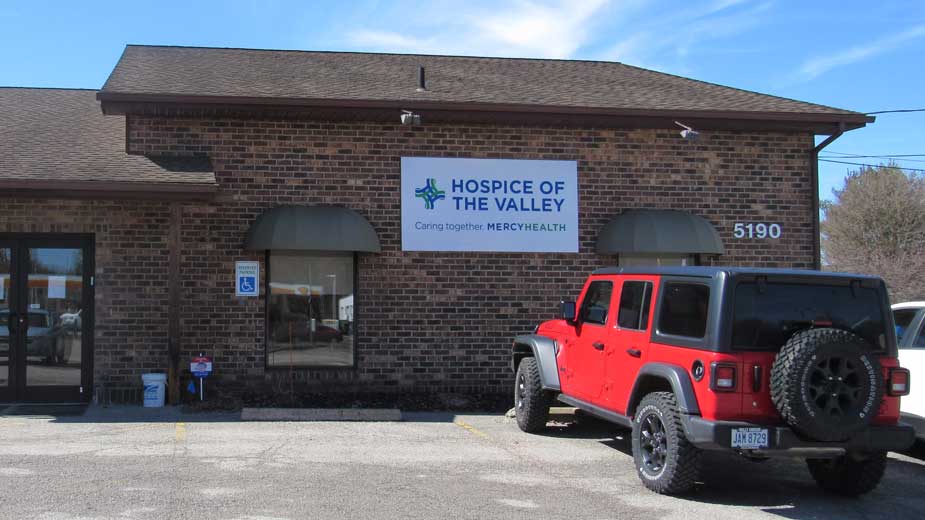YOUNGSTOWN, Ohio – Mercy Health-Youngstown is preparing to launch its first fellowship program this summer, part of an effort to widen the pipeline of doctors ready to work in the Mahoning Valley.
For decades, Mercy has run a residency program here, providing doctors their first steps into the medical world as professionals. The new addition, which expects to welcome its first two fellows July 1, brings in physicians for the next level of training. Mercy’s inaugural fellowship will focus on palliative care.
“It’s additional training on top of their specialty,” says Dr. Ronald Rhodes, a director of Mercy’s graduate medical education program. “[Palliative care] deals with those who have chronic or debilitating illness and also end of life challenges. It’s not just the physical part of care, but also their social needs, their spiritual needs, the psychological aspects. It’s also about taking care of the family as well.”
Among the work the fellows will be doing is in-patient acute care, training and care at Hospice of the Valley’s Hospice House with a focus on end of life needs, home visits and pediatric experience through Akron Children’s Hospital, as well as training in medical oncology and pain management.
What led Mercy to select palliative care as its first fellowship program in the area was a combination of patient needs, the rise of the field as a standalone specialty and the need to ensure doctors are in the area to take care of the Valley’s aging population, says Dr. James Kravec, Mercy Health-Youngstown’s chief medical officer and the system medical director for graduate medical education for Bon Secours Mercy Health.
“We know that palliative care and hospice are a relatively new specialty. The medicine has been around for a long time, but the specific training programs are relatively new. Our hospice and palliative care programs, especially with Hospice of the Valley, are second to none,” he says. “We felt that was the best program to jump into the fellowship world with because the need is there and the compassion and quality of care is already there. We can teach new physicians with that kind of training.”
Certified by the Accreditation Council for Graduate Medical Education, Mercy’s fellowship program is currently limited to two participants at a time. But, Kravec notes, such programs are “not plentiful” and competition can be fierce. Though the selection process is ongoing, there’s already been interest from across the country, which plays into another purpose of Mercy’s post-graduate programs for doctors: building a pipeline.
“We recruit and retain people we feel would contribute to us, are like-minded to us and want to participate in the care of our community. This clearly has an educational role, but we certainly hope to make this a pipeline to increase our provider pool,” Rhodes says.
In addition to the fellows – other programs are being planned, but both Kravec and Rhodes say it’s too early to discuss them – Mercy works with a cohort of 130 resident physicians each year.
“Filling the positions isn’t an issue,” Rhodes says, noting the program is at capacity. “When we talk about recruitment and retention, in each program we work with the director and residents to identify people we may want to have stay on with us. We like the way they work with patients, their mindset, their personality. That’s a two-way street.”
After their training is complete, most doctors opt to stay where they did their residency or return to the area they grew up – or the area their spouse grew up, if they’re married – to practice. Plenty of Mercy resident physicians are locals, Kravec says, and for those who aren’t, the pitch to get them to stay hits on familiar points for locals.
“We talk about the community itself: Youngstown is a family-centric, religion-centric area. … There’s no rush hour. If you like to travel, there are major airports within an hour. If you want to go to a ballgame or out for dinner, you can be in Cleveland and Pittsburgh in an hour and then come back,” Rhodes says. “Then we pitch ourselves. We take care of everyone in our community, regardless of socioeconomic or other factors. If you get in here, see how we do things and want to be a part of that, that’s a draw as well.”
The effort appears to be working. Kravec says that already this year, 16 doctors are slated to join Mercy Health Physicians in 2021, a number that’s sure to grow. The pipeline has also helped Mercy avoid problems that other health-care systems are encountering.
“I can’t stress enough the importance of having graduate medical education programs to supply physicians to our community. We hear nationally about a shortage of physicians and in the Mahoning Valley, we don’t feel that. The reason is because we train enough physicians who end up staying,” he says. “Our graduate medical education continues to be the primary source for our own hires. I can’t speak enough to what that means for the health and wellness of the Mahoning Valley.”
The graduate medical education program has been such a success that it’s being used as a model for other arms of Bon Secours Mercy Health, says Kravec, who serves as medical director of the graduate medical education program for the entire system, overseeing 600 residents across seven markets.
“This is really a strategic focus of Bon Secours Mercy Health: how do we replicate what we’re doing in Youngstown? I’m excited about the conversations we’re having in other areas across our multistate footprint,” he says.
Pictured: Doctors in Mercy Health’s palliative care fellowship will do part of their training with Hospice of the Valley.
